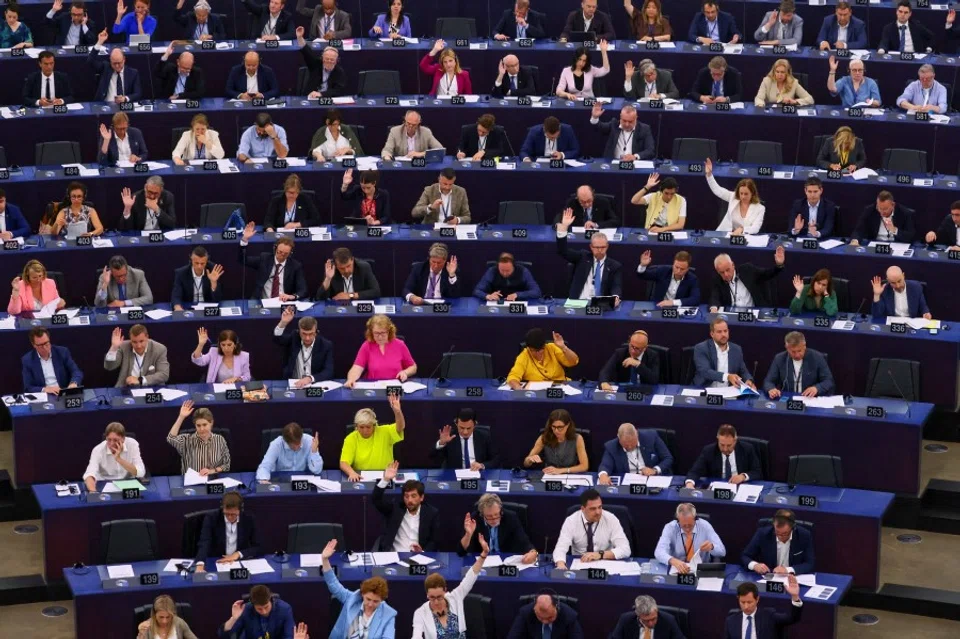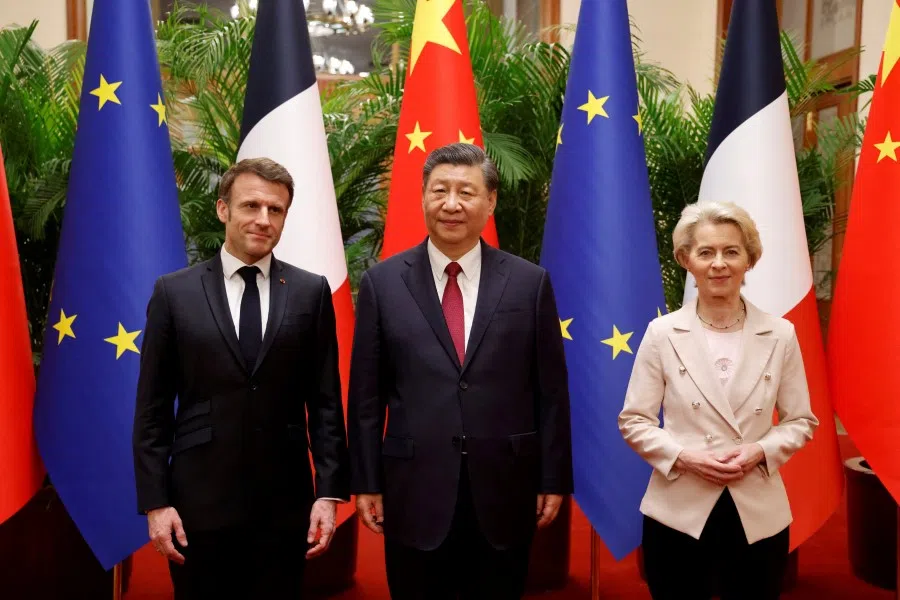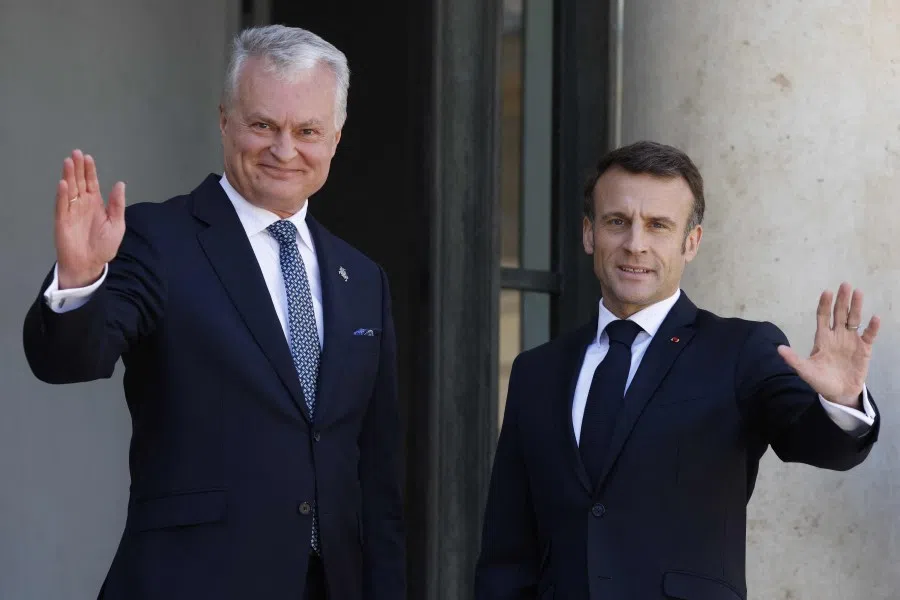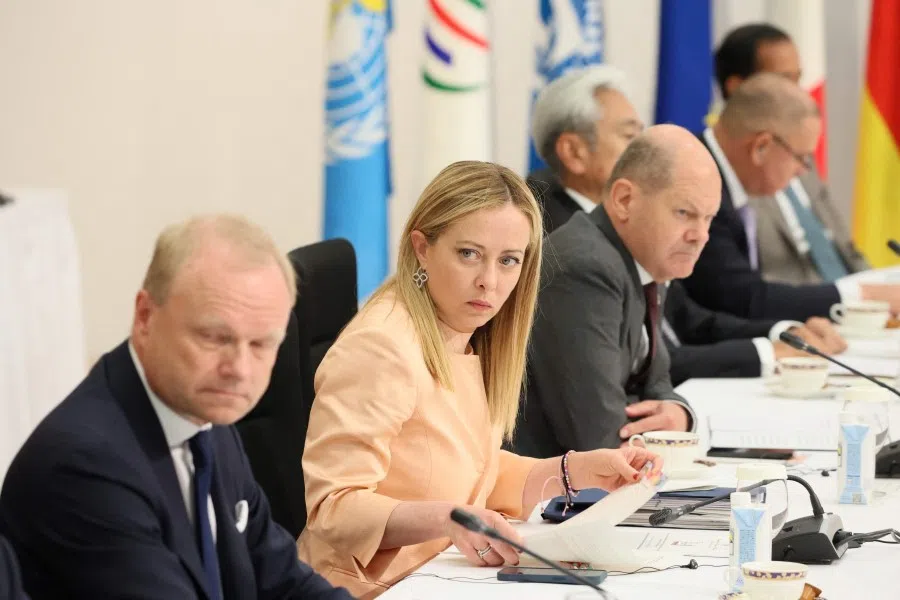One Union, many voices: The EU's fragmented approach to China
Europe's disunity may be working to its disfavour, says Italian academic Alessandro Albana. While Brussels and some EU member states emphasise "de-risking", there are other factors to think about, such as Europe's long-term economic relations with China and the possibility that China can play a role in bringing an end to the Ukraine war.

Over the past three years, political relations between China and the EU seem to have unravelled remarkably. If dissatisfaction and mounting apprehension over China's rise and its economic and financial play in Europe was a factor, the Covid-19 pandemic followed by the conflict in Ukraine further exacerbated Europe's discontent.
The "zero-Covid" policy enforced in the PRC until last winter drew frustration in Europe, where companies, firms and the political leadership had been eager to restart business with China back to pre-Covid days. Furthermore, since the outbreak of the war in Ukraine in February 2022, Beijing's reputation vis-à-vis the EU has been tarnished even more due to its "no limits" friendship with Russia and its failure to break up its strategic partnership and condemn the Kremlin's bellicose pursuits.
Discordant approaches in the EU
Recently, however, the EU and some of its member states are no longer speaking with one voice, and are showing disunity and even fragmentation in their dealings with China. Different approaches among some member states can hardly be ignored, but even within EU institutions, an agreement regarding the handling of bilateral relations seems to be lacking.
Take, for instance, the Comprehensive Agreement on Investment (CAI) that China and the EU agreed on in 2020, which the European Parliament has not ratified to date on the grounds of criticism toward Beijing. Disunity among member states and EU institutions has been apparent, with German Chancellor Olaf Scholz championing the agreement, French President Emmanuel Macron speaking of it as "not practicable", and EU bodies going in random order with the European Parliament being against the CAI, President of the European Council Charles Michel in favour of it, and President of the European Commission Ursula von der Leyen urging a "reassessment" of the accord.

Macron and von der Leyen's joint visit to China in April provides additional insight into the diverging approaches to China emerging in the EU. During the visit, Macron was prone to providing Beijing with the opportunity to strengthen bilateral relations, denying the inevitability of an "inescapable spiral of mounting tensions between the West and China".
On the contrary, von der Leyen described the PRC as a country "becoming more repressive at home and more assertive abroad" and defined Xi's visit to Moscow in March 2022 as a "stark reminder" of China's global assertiveness.
Earlier, von der Leyen referenced China's partnership with Russia to dismiss the 12-point declaration on the political settlement of the Ukraine crisis. More broadly, von der Leyen was critical of China's stance in the conflict in Ukraine, going as far as to warn that "how China continues to interact with Putin's war will be a determining factor for EU-China relations going forward".
Perhaps more importantly, von der Leyen stated that due to the peculiarity of China's state capitalism, EU relations with Beijing need to embrace a "de-risking" strategy, addressing existing imbalances in order to secure a more equitable partnership. The urgency of such reassessment, von der Leyen clarified, does not equate to "decoupling", as a significant cooling of bilateral relations runs counter to "Europe's interests".
Under such circumstances, it is no surprise that the fanfare around Macron was far greater than the lukewarm reception of von der Leyen during their joint visit to the PRC this spring. Most recently, the G7 summit held in Hiroshima further embraced "de-risking" as a strategic framework for the pursuit of relations with China.
Associating China with Russia appears a significant factor for the growing criticism of such countries - and the European Commission itself - particularly in eastern European states...
Varied and complex reasons
The reasons behind the growing disunity within the EU on the approach to China are varied and complex.
Some countries gain more than others in preserving economic relations with Beijing and have been eager to see the "zero-Covid" policy lifted in the PRC in order for economic exchanges to be restored. Not surprisingly, France and Germany are the largest EU member states rushing to revive trade and commerce with China. Companies and firms in both countries seem to loom large in supporting such policies, especially in Germany, where exports to China have declined in recent months notwithstanding the lifting of the "zero-Covid" policy.

Other EU member states walk a different path depending on their political leadership's approach to China. Associating China with Russia appears a significant factor for the growing criticism of such countries - and the European Commission itself - particularly in eastern European states, where opposition to Russia is more radical.
Such processes intertwine with other political initiatives, as the Lithuanian case demonstrates. In 2021, Taiwan inaugurated its representative office - a de facto embassy - in Vilnius. The following year, the Lithuanian Trade Representative Office in Taiwan began operations. Such moves significantly severed diplomatic relations between Lithuania and the PRC.
Finally, diplomatic pressure from the US and political values might also be playing some role: in Europe, criticism toward China has generally been on the rise in the past years, and the conflict in Ukraine has only exacerbated that tendency. European Commission President von der Leyen may very well act as a representative of such perspectives.
Italy's bind
Against a backdrop of divergence and disunity within the EU, recent statements from members of the Italian government have further complicated the picture. In fact, after describing Rome's participation in the BRI through the memorandum of understanding (MOU) inked in March 2019 as a "big mistake", Prime Minister Giorgia Meloni and other ministers recently made noises about the prospect of the MOU with China not being renewed after its expiry in March 2024.
Considering the right-wing coalition's longstanding criticism of the BRI and the PRC leadership more broadly, such statements come as no surprise. Should that be the case, Beijing will suffer another headache from the diplomatic setback dealt by the only G7 country and a founding member of the EU to have joined the BRI.
However, Rome pulling out from the BRI will not necessarily mean a cooling of its bilateral relationship with China. In fact, Prime Minister Meloni declared that, as with other countries in the EU, good relations with China can be pursued successfully even outside the BRI framework. In this context, should the MOU on the BRI not be given another chance, Italy might still be interested in negotiating new rounds of commercial agreements with China, moving a step forward, rather than scrapping the MOU on the BRI.
That pragmatism notwithstanding, Prime Minister Meloni's diplomacy leaves little doubt that it reaffirms the centrality of transatlantic ties for Italy and Europe, showcasing significant differences from the multi-layered approach and more autonomous flavour of Berlin's and Paris' foreign policy vis-à-vis the US. This, too, might have a relevant deal of influence on Rome's decision not to extend the MOU with Beijing for five additional years.
Mounting disunity makes the EU weaker vis-à-vis Beijing, and it seems unlikely that Beijing would not recognise the scenario as such...

A weaker EU vis-à-vis Beijing?
From China's perspective, the scepticism of some EU institutions (namely the Commission) and a number of European countries - Italy included - is to be understood as the product of diplomatic postures guided, if not dictated, by the US. There is reason to believe that Chinese authorities are aware of, and uneasy about, the growing deterioration of their reputation within Europe, not least in terms of the implications this may have on bilateral trade.
Chinese authorities have been critical, describing "de-risking" as making no difference to "decoupling", if not in rhetoric. Nevertheless, Beijing showed some restraint in resorting to radically critical tones vis-à-vis Europe, in an apparent attempt to avert diplomatic confrontations that could lead to a further cooling in bilateral relations.
Since the second half of 2022, due to various factors, China seems eager to establish new opportunities to re-engage Europe, not only in the economic realm. As noted by Philippe Le Corre: "The EU remains in Beijing's eyes the best possible Western partner and the most promising market."
However, mounting disunity makes the EU weaker vis-à-vis Beijing, and it seems unlikely that Beijing would not recognise the scenario as such, especially in consideration of the availability of Berlin and Paris in setting a different tone in diplomatic and economic relations.
China's diplomatic activism in the framework of Russia's war in Ukraine may very well act as another test bed for Beijing in assessing its relations with EU and EU nations.
Russia's situation another destabilising factor
Also, amid the war in Ukraine, the recent mutiny and alleged coup attempt by the Wagner Group may signal that Putin's power is not as solid as many have considered. While it is too early to tell whether this is true or not, some political leaders have already come to question Putin's real strength.

For China, such a development is a source of concern. However, the prospect of instability in Russia, and the perception of Putin's dwindling leadership, are likely to strengthen Beijing's support for its "no-limits" friend. There appears no reason to expect changes in China's stance toward the conflict in Ukraine.
More importantly, a war ravaging people's existence for almost one and a half years urgently needs to come to an end through negotiations rather than with military superiority on the ground. But this option runs exactly counter to the US doctrine on the war in Ukraine, namely providing aid to Kiev in order for Ukraine to win the war militarily.
Due to the alignment with the US doctrine on the conflict, in the foreseeable future, the EU seems unlikely to explore the prospect of participating in China's diplomatic efforts as a negotiator or a similar role. In this context, China's diplomatic activism in the framework of Russia's war in Ukraine may very well act as another test bed for Beijing in assessing its relations with EU and EU nations.
Related: China's strategy to resist the US but bring Europe close | America and Europe are coming together against China, but will it work? | Will Europe pour more money into China? | Macron's visit: China making a tear in the 'iron curtain' drawn by the US? | EU strategic autonomy: Easier said than done | Germany's China policy: Will economic interests override values?



![[Big read] When the Arctic opens, what happens to Singapore?](https://cassette.sphdigital.com.sg/image/thinkchina/da65edebca34645c711c55e83e9877109b3c53847ebb1305573974651df1d13a)
![[Video] George Yeo: America’s deep pain — and why China won’t colonise](https://cassette.sphdigital.com.sg/image/thinkchina/15083e45d96c12390bdea6af2daf19fd9fcd875aa44a0f92796f34e3dad561cc)
